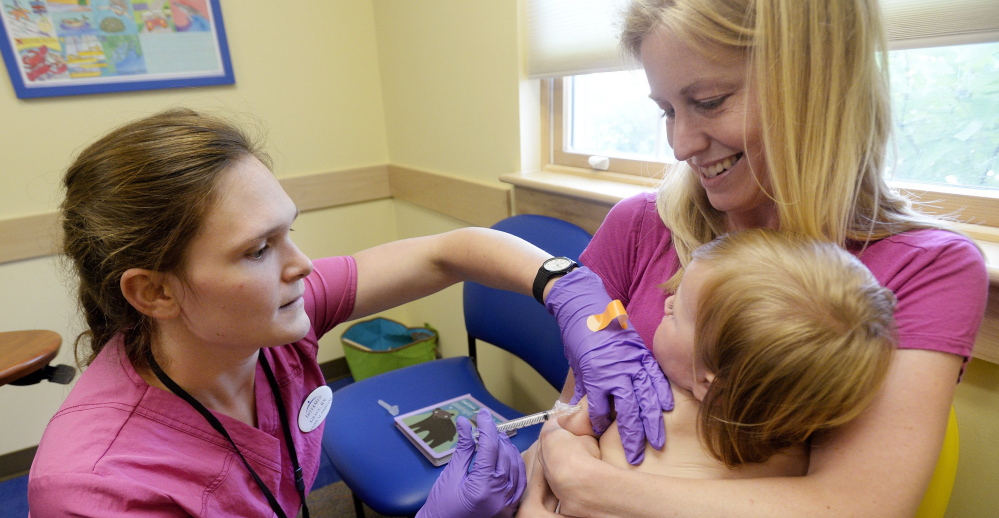The growing and stubborn segment of the population that refuses to innoculate their children gets the bulk of the attention in the discussion about falling rates of vaccinations, and with good reason. It is that frustrating refusal, born out of unfounded worries about the safety of vaccinations, that is driving the unnecessary return of highly preventable diseases such as measles and whooping cough.
But while the rising number of parents opting out of immunizing their children is certainly a danger, so too is the significant number of kids who are not up to date on vaccinations for other reasons. Both groups help open the way for the spread of communicable diseases, but the latter group may be easier reached by interventions, and they should not be forgotten as the Legislature prepares to address vaccination rates this session.
EXEMPTIONS TARGETED
Last school year, 5.2 percent of Maine kindergartners received a philosophical exemption to vaccination requirements. That’s up from 2.7 percent a decade ago, and good for the fifth-highest opt-out rate in the nation.
That may not seem like a lot, but it is enough to break down “herd immunity,” when the vaccination rate is high enough to protect children who are too young for vaccinations or who cannot be vaccinated for medical reasons.
When herd immunity is broken, disease can spread quickly, as it has in other states with high exemption rates, like Washington, Oregon and California, where a measles outbreak began last month at Disneyland and has now spread to 94 people in eight states.
A bill submitted by Rep. Richard Farnsworth, D-Portland, would require parents who wish to opt out of vaccinations for children starting school to consult a primary care professional, and to receive a signature if they want to opt out after that.
States that have made it more difficult to receive an exemption have seen their vaccination rates rise, and Farnsworth’s bill would likely help prevent the spread of otherwise highly preventable diseases.
OTHER BARRIERS
Farnsworth’s bill wouldn’t address the much larger number of children who fall behind on vaccinations because they don’t regularly see their physician.
A 2013 study completed on behalf of the Centers for Disease Control and Prevention found that almost half of children born between 2004 and 2008 fell behind on vaccinations by their second birthdays, with only a small percentage of that lag attributed to concerns about the safety of vaccinations.
By the last year of the study, the average child spent a total of 44 days without the necessary vaccinations. Many of these children likely caught up with their immunizations before entering school, but not before spending time at parks, playgrounds and restaurants while vulnerable to disease, amid a rising number of children receiving no immunizations whatsoever.
The vaccination delay is understandable. The CDC schedule calls for a child to receive around 23 doses of 10 different vaccines by the time he or she is 24 months old.
In the best of circumstances, a parent of a young child can lose track. In others, the parents simply cannot fit that many appointments into their schedule, particularly if they have transportation or work constraints.
These parents already have begun the immunization process for their children, and they would be willing to complete it if these barriers could be overcome.
Fortunately, Maine is already doing a lot in this area. The state offers universal coverage for vaccinations through a program funded by providers, and initiatives such as VaxMaineKids.org and First STEPS help spread information about immunizations and bring children up to date.
But as lawmakers rightfully look for ways to dispel the myths surrounding vaccines, they also should make sure physicians and public health officials have the tools to help parents keep their children fully immunized.
Send questions/comments to the editors.



Success. Please wait for the page to reload. If the page does not reload within 5 seconds, please refresh the page.
Enter your email and password to access comments.
Hi, to comment on stories you must . This profile is in addition to your subscription and website login.
Already have a commenting profile? .
Invalid username/password.
Please check your email to confirm and complete your registration.
Only subscribers are eligible to post comments. Please subscribe or login first for digital access. Here’s why.
Use the form below to reset your password. When you've submitted your account email, we will send an email with a reset code.